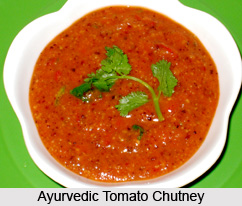 Ayurvedic Tomato chutney is a very common chutney served with dishes like idli, dosa, appe, and even chapathi or puri. The dish is a delight for the calorie conscious people as tomato is low on calorie. It is very easy to prepare and can be readied in less than twenty minutes. Tomato, onion, safflower oil, hing, cumin seeds, black mustard seeds, curry leaves, turmeric powder, green chilly and sugar are the primary ingredients required for preparing this yummy chutney.
Ayurvedic Tomato chutney is a very common chutney served with dishes like idli, dosa, appe, and even chapathi or puri. The dish is a delight for the calorie conscious people as tomato is low on calorie. It is very easy to prepare and can be readied in less than twenty minutes. Tomato, onion, safflower oil, hing, cumin seeds, black mustard seeds, curry leaves, turmeric powder, green chilly and sugar are the primary ingredients required for preparing this yummy chutney.
Ingredients of Ayurvedic Tomato Chutney
•One large onion finely chopped
•Two tablespoon of safflower oil
•One big size tomato finely chopped
•A pinch of hing
•One teaspoon of cumin seeds
•One teaspoon of black mustard seeds
•Three fresh curry leaves
•One tablespoon of fresh coriander leaves well chopped
•One-fourth teaspoon of turmeric powder
•Half small green chilly finely chopped
•One teaspoon of sugar
Method of Preparing Ayurvedic Tomato Chutney
•In order to prepare Ayurvedic tomato chutney, first put a frying pan on medium heat.
•Add oil, cumin and mustard seeds. Wait till the seeds pop.
•Then add hing, curry leaves, coriander, chilly and onions. Sauté till the onions turn brown.
•Now put tomatoes and sugar. Gently stir so that the tomato is well coated.
Cover and turn off the heat and after few minutes serve.
Note: Ayurvedic tomato chutney should be consumed within few hours of its preparation and can be kept in stainless steel made pot.
Benefits of Ayurvedic Tomato Chutney
Consumption of this chutney is beneficial for heath as the main ingredient which is tomato and the spices used are enriched with various qualities.
•Tomato is enriched with vitamins A, C, K, folate and potassium.
•Tomato provides niacin, vitamin B6, magnesium, phosphorus and copper, all of which are required for the proper nourishment of health.
•Cumin is a rich source of iron, a mineral that plays many vital roles in the body.
•Black mustard seeds are enriched with calcium, manganese, omega 3 fatty acids, iron, zinc, protein and dietary fiber.
•Curry leaves fights diabetes, improves digestion, and lowers cholesterol.
•Coriander is rich in micronutrients and contains minerals like calcium, magnesium, sodium and potassium.




















